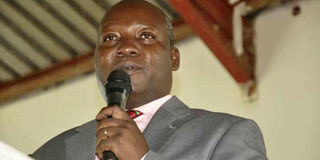Government to close illegal schools countrywide

Mr Edward Ssebuchu, the commissioner of private schools at the Ministry of Education. PHOTO BY DERRICK WANDERA
What you need to know:
In 2017, government closed over 1, 300 school across the country for having no proper structures, no licenses and pit latrines among other requirements.
Ministry of education has said that they will start to close schools that have are operating without licences across the country.
Mr Edward Ssebuchu, the commissioner of private schools at the Ministry of Education said they have received numerous intelligence about mushrooming private schools without licenses and they will close them starting this week.
“There is always a tendency of some people opening up and starting schools at the start of the year to target the new entrants from primary seven and those going to senior five. We have already received information and we shall go around the country arresting and closing them starting this week,” Mr Ssebuchu said during a thanks giving ceremony of Maryland High School Entebbe.
A school survey done by Ministry of Education in 2015 indicated that there are 2, 875 privately owned schools across the country.
In 2017, government closed over 1, 300 school across the country for having no proper structures, no licenses and pit latrines among other requirements.
In February last year, about 300 private primary and secondary schools were blocked from opening for first term after they failed to meet the minimum standards as required by the ministry of Education.
Mr Ssebuchu said since the crackdown three years ago, there have been other sprouting schools and this has led to a subsequent growth in the number of substandard private schools.
“We had relaxed and this has given many people an advantage. We shall work on them now. People have to go through the right channels of getting a license other than just using fraudulent ways of operation,” he said.
According to the ministry’s guidelines, for a person to get a license for a private school, they have to write to the permanent secretary who asks the district authorities to carry out an assessment to see whether one has the requirements to run a school.
On enrolment, one is allowed to open a private primary school if they have at least 55 pupils enrolled in each class while the minimum number for secondary schools is 40 students per class.
At the same event, Mr SSebuchu said called on government schools to embrace the new curriculum which focuses on the students’ participation in class.
“Initially, the teachers used to come and lecture the students and go away. Now we want to see that the students are more involved and can use what they learn in class to in their day-to-day life,” he said.
However, Dr Dalton Ssegawa, the Director of Maryland High School Entebbe said that most private schools are struggling to adapt to the new curriculum, one week after it was rolled out because of lack of books for the syllabi.
“We are yet to receive books and the student discovery system in the new curriculum requires a lot things including a computer per student. This will be hard,” Dr Ssegawa said.
Mr Ssebuchu said, “The books of the new curriculum can be found on the National Curriculum Development Center website.”




